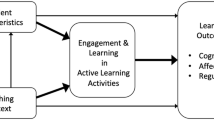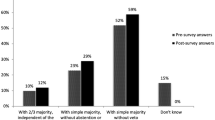Abstract
This article examines the ‘lessons’ from the most recent Scholarship of Teaching and Learning research in political science that appears in three North American academic journals. The article focuses on the literature that examines the effectiveness of ‘active learning’ classroom techniques. Although the most commonly used technique to promote active learning is the in-class simulation, the evidence on the effectiveness of simulations is decidedly mixed. The article continues by exploring other available, but often ignored, active learning classroom techniques.
Similar content being viewed by others
References
Austin, W.C., McDowell, T. and Sacko, D.H. (2006) ‘Synergy across the curriculum: Simulating the institution of postwar Iraqi government’, Journal of Political Science Education 2 (2): 89–112.
Ball, W. (2005) ‘From community engagement to political engagement’, PS: Political Science and Politics 38 (1): 287–291.
Baranowski, M. (2006) ‘Single session simulations: The effectiveness of short congressional simulations in introductory American government classes’, Journal of Political Science Education 2 (1): 33–51.
Beaumont, E. and Battistoni, R. (2006) ‘Beyond civics 101: Rethinking what we mean by civic education’, Journal of Political Science Education 2 (3): 241–247.
Bernstein, Jeffrey, L. and, Deborah S. Meizlish (2003) ‘Becoming congress: A longitudinal study of the civic engagement implications of a classroom simulation’, Simulation and Gaming 34 (2): 198–219.
Bonwell, C. and Eison, J. (1991) Active Learning: Creating Excitement in the Classroom AEHE-ERIC Higher Education Report No.1, Washington DC: Jossey-Bass.
Bonwell, Charles C. (2003) Active Learning: Creating Excitement in the Classroom: Active Learning Workshops, Green Mountain Falls, CO.
Bosworth, K. and Hamilton, S. (1994) Collaborative Learning: Underlying Process and Effective Techniques, San Francisco, CA: Jossey-Bass Publishing.
Boyer, E. (1990) Scholarship Reconsidered: Priorities of the Professoriate, San Francisco: Josey Bass.
Brock, K.L. and Cameron, B.J. (1999) ‘Enlivening science courses with Kolb's learning preference model’, PS: Political Science and Politics 32 (3): 251–256.
Burch, K. (2000) ‘A primer on problem based learning for international relations courses’, International Studies Perspective 1 (1): 31–32.
Daugherty, B.K. (2003) ‘Byzantine politics: Using simulations to make sense of the middle east’, PS: Political Science and Politics 36 (2): 239–244.
Dorn, D.S. (1989) ‘Simulation games: One more tool on the pedagogical shelf’, Teaching Sociology 17 (1): 1–18.
Duch, B.J., Groh, S.E. and Allen, D.E. eds. (2001) The Power of Problem-Based Learning A Practical ‘How To’ for Teaching Undergraduate Courses in Any Discipline, Sterling, VA: Stylus Publishers.
Ferman, B. (2012) ‘Educating for democracy’, Journal of Political Science Education 8 (3): 231–250.
Frederking, B. (2005) ‘Simulations and student learning’, Journal of Political Science Education 1 (3): 385–394.
Freitas, de (2006) ‘Using games and simulations for supporting learning’, Learning, Media and Technology 31 (4): 343–358.
Gormley-Heenan, C. and McCartan, K. (2009) ‘Making it matter: Teaching and learning in political science using an audience response system’, European Political Science 8 (3): 379–391.
Hale, S. (2006) ‘Politics and the real world: A case study in developing case-based learning’, European Political Science 5 (1): 84–96.
Hamann, K., Wilson, B. and Pollock, P. (2009) ‘Who SoTLs where? Publishing the scholarship of teaching and learning in political science’, 42 (4): 729–735.
Hensley, T.R. (1993) ‘Come to the edge: Role playing activities in a constitutional law class’, PS: Political Science and Politics 26 (1): 64–68.
Ishiyama, J. (2002) ‘Does early participation in undergraduate research benefit social sciences and humanities students?’ College Student Journal 36 (3): 381–387.
Ishiyama, J. (2007) ‘Constitutional engineers’, Political Science Educator.
Kaunert, C. (2009) ‘The European union simulation: From problem-based learning (PBL) to student interest’, European Political Science 8 (2): 254–265.
Krain, M. and Lantis, J. (2006) ‘Building knowledge? Evaluating the effectiveness of the global problems simulation’, International Studies Perspectives 7 (3): 395–407.
Lay, J.C. and Smarick, K.J. (2006) ‘Simulating a senate office: The impact on student knowledge and attitudes’, Journal of Political Science Education 2 (2): 131–146.
Lopatto, D. (2003) ‘The essential features of undergraduate research’, CUR Quarterly 29 (3): 139–142.
Martin, A.J. (2003) ‘Boys and motivation’, The Australian Educational Researcher 30 (3): 43–62.
Meizlish, D.S. and Bernstein, J.L. (2003) ‘Unpacking the “Education” in civic education’, Paper presented at the International Civic Education Conference; 16–18 November, New Orleans, LA.
Meyers, C. and Jones, T.B. (1993) Promoting Active Learning: Strategies for the College Classroom, San Francisco: Jossey-Bass.
Michaelsen, L.K., Watson, W.E., Cragin, J.P. and Fink, L.D. (1982) ‘Team-based learning: A potential solution to the problems of large classes’, Exchange: The Organizational Behavior Teaching Journal 7 (1): 18–33.
Pace, D.B., Bishel, R.B., Holquist, P. and Makowski, G. (1990) ‘Structure and spontaneity: Pedagogical tensions in the construction of a simulation of the cuban missile crisis’, The History Teacher 24 (1): 53–65.
Poplin, M. and Weeves, J. (1992) ‘Listening at the learner's level’, The Executive Educator 15 (4): 14–19.
Powner, L.C. and Allendoerfer, M.G. (2008) ‘Evaluating hypotheses about active learning’, International. Studies Perspectives 52 (2): 75–89.
Rodgers, Y.van der M. (1996) ‘Role-playing exercise for development and international economics courses’, The Journal of Economic Education 27 (3): 217–23.
Shaw, C.M. (2006) ‘Simulating negotiations in a three-way civil war’, Journal of Political Science Education 2 (2): 51–71.
Shellman, S. (2001) ‘Active learning in comparative politics: A MockGerman election and coalition-formation simulation’, PS: Political Science and Politics 34 (4): 827–834.
Shellman, S. and Turan, K. (2006) ‘Do simulations enhance student learning? An empirical evaluation of an IR simulation’, Journal of Political Science Education 2 (1): 19–32.
Smith, E.T. and Boyer, M.A. (1996) ‘Designing in-class simulations’, PS: Political Science and Politics 29 (4): 690–694.
Williamson, J. and Gregory, A. (2009) ‘Problem based learning in introductory American politics classes’, Paper presented at the annual meeting of the Midwest Political Science Association 67th Annual National Conference, The Palmer House Hilton, Chicago, IL.
Author information
Authors and Affiliations
Rights and permissions
About this article
Cite this article
Ishiyama, J. Frequently used Active Learning Techniques and Their Impact: a Critical Review of Existing Journal Literature in the United States. Eur Polit Sci 12, 116–126 (2013). https://doi.org/10.1057/eps.2012.3
Published:
Issue Date:
DOI: https://doi.org/10.1057/eps.2012.3




